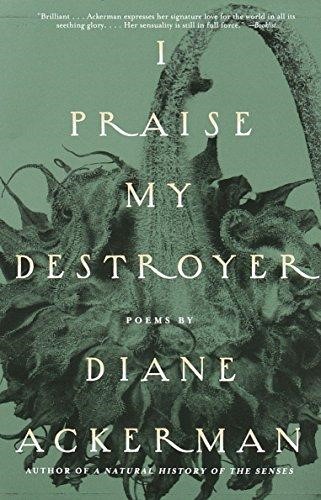The Grapevine Art & Soul Salon
Views and Reviews

The Ultimate Praise Poem: An Introduction to Diane Ackerman's I Praise My Destroyer
by Barbara Knott
While considering our focus in this issue on praise poems and looking around for suitable pieces to publish or quote, this book on one of my bookshelves spoke out, “How about introducing the ultimate praise poem, the one we make, if we can, to the very force that carries away, eventually, all the lives that we love in this world?” Think of Jesus on the cross or your mother’s last words or the face of a child somewhere in the world starving to death. Think of your personal losses to death, mourning that increases as years go by. How can one praise one’s own destroyer?
I found myself looking again through the eloquent eyes of Diane Ackerman who lives, moves, and has her being in a force field of praise, exercising her gift of poetic speech all over the place. And, in praising creation, she does not shy away from her destroyer.
In this slender volume are a hundred or so pages of poems including, on page 4, the title poem, “I Praise My Destroyer,” that asks over and over the troubling question, “How can it all end?” She answers first by affirming life in all its richness, its joys and sorrows. She is preoccupied with passion’s rule, deep play/ and wonder even as worry hangs like a curtain of trembling beads/ across every doorway. And at the end, she declares … it was grace to live/ among the fruits of summer, to love by design,/ and walk the startling Earth/ for what seemed/ an endless resurrection of days. As a lover whispers to her in the poem, “You are so alive,” so I say to readers, the work and play in poetry of Diane Ackerman is so alive!
Her book opens with a theme-setting “School Prayer"(p. 3): I will honor all life/— wherever and in whatever form/ it may dwell/— on Earth my home,/ and in the mansions of the stars.
Diane Ackerman is also a naturalist. No surprise. In a poem she wrote to Carl Sagan, “We Die” (p. 7), she issues a masterful call to live in the moment. Her poems are replete with sensuous and sensual images, from the title image in “The Consolation of Apricots” (p. 60) to the world encompassing image of the cuddle warmth of all matter in “Underworld” (p. 62.) She even notices things like the wind combed by tree limbs in “Autumn Laps” (p. 41).
Generous in her expectations, she tells her readers, … steer a caravan of small daily marvels/ through the architecture of annihilation,/ and you will have a poem … (“Unrequited Poem,” p. 68). Yes, if we could keep up with Diane Ackerman, we could all be millionaires with our wealth in words and could dwell in brilliance as we make our way through the world toward a certain death someday, some way, consoled by the amount of life we have lived fully.
You may know the poet from acquaintance with one or more of the 24 books she has written (at last count) or from the highly successful television series A Natural History of the Senses, based on her book of the same title and her work and travel, or from the movie made from her book The Zookeeper’s Wife. Do make her acquaintance if you haven’t done so already, and if you have, Cheers!
Diane Ackerman, I Praise My Destroyer (New York: Vintage Books, a division of Random House, Inc., 1998).
Copyright 2019, Barbara Knott. All Rights Reserved.